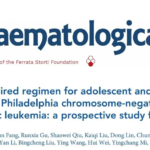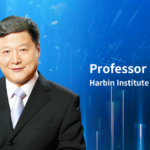In January 2024, the team led by Academician Saijuan Chen and Chief Physician Jianqing Mi at the Shanghai Institute of Hematology published a research paper in the journal “Nature Communications.” The paper, titled “Neutrophil activation and clonal CAR-T re-expansion underpinning cytokine release syndrome during ciltacabtagene autoleucel therapy in multiple myeloma,” reveals the temporal changes in cytokine release and the molecular mechanisms behind CAR-T re-expansion in cell immunotherapy.
AcademicianSaijuan Chen of the Shanghai Institute of Hematology and Chief Physician Jianqing Mi of Ruijin Hospital’s Department of Hematology served as the corresponding authors of the paper. Dr. Shuangshuang Yang, a doctoral student in the Department of Hematology, Associate Chief Physician Jie Xu, and Associate Researcher Yuting Dai from the National Center for Translational Medicine are the co-first authors of the paper.


Over the past decade, CAR-T therapy has made groundbreaking progress in the treatment of hematological malignancies. Despite the encouraging therapeutic outcomes of CAR-T, its toxic reactions, especially cytokine release syndrome (CRS), cannot be overlooked. Reports indicate that severe CRS occurs in 46% of acute B lymphoblastic leukemia, 13% of B-cell lymphoma, and 41% of multiple myeloma cases treated with CAR-T.
CRS is an inevitable cellular immune response in CAR-T therapy. Moderate CRS can facilitate the clearance of tumor cells, but excessive CRS may cause multi-organ damage, even life-threatening conditions. The mechanism behind CRS is complex, and there has been a lack of detailed analysis on the emergence and dynamic development of CAR-T-related CRS in humans.
Ciltacabtagene autoleucel (Cilta-cel, previously known as LCAR-B38M) is a dual-targeting BCMA CAR-T product that has shown outstanding efficacy in patients with relapsed/refractory multiple myeloma (R/RMM). This product has been approved by the FDA in the United States, the European Medicines Agency, and regulatory authorities in Japan.
Led by Academician Saijuan Chen and Chief Physician Jianqing Mi, the team conducted a multi-faceted study on cytokine profiles and gene transcriptomes in peripheral blood samples from patients treated with Cilta-cel for R/R MM. They revealed the temporal characteristics of the “signal pathway activation-cytokine release-clinical symptoms manifestation” axis, demonstrating the cascading development of acute inflammatory responses. The study also noted that CAR-T cell re-expansion could be triggered by multiple factors, potentially leading to more intense immune responses than those elicited by a single tumor antigen.
Importantly, the FDA is currently focusing on the risk of CAR-T products inducing T-cell tumors. This work is the second study to report on the clonal expansion of CAR-T following anti-CD19 CAR-T (CTL019, Kymriah). Unlike CTL019, this study found monoclonal expansion characteristics in CAR-T in a case of fatal CRS, with a functional loss-of-function somatic mutation in the TET2 gene, which already accounted for 0.27% of the patient’s T cells before CAR-T preparation. This suggests that the CAR-T cells, under the influence of external stress responses, might gain a growth advantage in a population with mutations, possibly before the first CRS had fully subsided. Through screening of the T-cell receptor (TCR) antigen database, transcriptome sequence comparison, and experimental validation, the study discovered that this monoclonality could further enhance its proliferative capacity early in the secondary expansion, potentially due to an immune response dependent on TCR activation triggered by HHV7 virus. The research also proposes measures to avoid this severe side effect, such as detecting clonal hematopoiesis-related gene mutations before CAR-T preparation, infusing intravenous immunoglobulin to enhance immunity, and early use of cytokine-targeted drugs to reduce the likelihood of CAR-T clonal expansion and the risk of severe CRS.
This study provides clinicians with timely and precise options for targeted drugs and treatment windows. It also suggests that the phenomenon of CAR-T re-expansion requires closer monitoring and effective medical management to reduce the risk of severe mortality.
Author Introductions
Saijuan Chen is an Academician of the Chinese Academy of Engineering, a doctoral supervisor, a professor at Shanghai Jiao Tong University School of Medicine, a lifetime professor at Ruijin Hospital affiliated with Shanghai Jiao Tong University School of Medicine, the director of the National Center for Translational Medicine (Shanghai), the director of the National Key Laboratory of Genomics and Diseases, the honorary director of the Shanghai Institute of Hematology, and currently the vice president of the Chinese Medical Association. Her research focuses on the pathogenesis of hematological malignancies and the study of novel targeted therapies.
Jianqing Mi is a chief physician, a doctoral supervisor, the head of the Hematology Department at Ruijin Hospital affiliated with Shanghai Jiao Tong University School of Medicine, the deputy director of the Shanghai Institute of Hematology, currently a national committee member of the Hematology Branch of the Chinese Medical Association, the chairman of the Hematology Translational Professional Committee of the Shanghai Medical and Pharmaceutical Industry Association, and the chairman of the Hematology Branch of the Asia Pacific Association of Medical Immunology. His research focuses on basic and clinical studies on hematological malignancies and platelet disorders.
Shuangshuang Yang is a physician at the Department of Hematology, Ruijin Hospital affiliated with Shanghai Jiao Tong University School of Medicine. Her research focuses on the clinical and basic studies of CAR-T therapy for multiple myeloma.
Jie Xu is an associate chief physician and associate researcher at the Department of Hematology, Ruijin Hospital affiliated with Shanghai Jiao Tong University School of Medicine. Her research focuses on translational medicine studies of cellular immunotherapy for hematologic malignancies.
Yuting Dai is an associate researcher at the Department of Translational Medicine, Ruijin Hospital affiliated with Shanghai Jiao Tong University School of Medicine. Her research focuses on the multi-omics and immune microenvironment of hematologic tumors.


